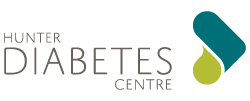Services designed
to genuinely help
Explore our comprehensive range of diabetes services tailored to your unique needs. From education and counselling to advanced treatments, we offer a wide array of resources to support your diabetes management.
1/5
Endocrinology is the study of internal glands and hormones. Dr Morbey is the endocrinologist at Hunter Diabetes Centre, with her predominant area of interest being diabetes. Dr Morbey can provide consultations, diagnosis of conditions, follow-ups, hormone testing, menopause, and thyroid and diabetes care.
2/5
Nutrition
What to expect with your initial consultation with our dietitian:
- To discuss the reason for your referral and set health-focused goals realistic to your lifestyle and other chronic diseases.
- To have your measurements taken (if appropriate) and look at your blood test results, including your BGL book.
- Conduct a nutrition assessment based on your anthropometric, biochemistry, social and diet history.
- To decide if you need further consultations with our Diabetes Nurse Practitioner or your Endocrinologist.
- An easy-to-follow individualised nutrition care plan to support your chronic disease and improve your outcome
If you have a private health fund (e.g. NIB, HCF), you may be entitled to a rebate, please contact your provider for more information.
Department of Veterans Affairs (DVA) Gold cardholders will be billed directly to DVA, a D904 referral is required prior to your consultation, contact your GP regarding this.
If you have a chronic condition (e.g. Diabetes, PCOS), you may be entitled to a Medicare rebate; an Enhanced Primary Care plan (EPC) is required before your consultation. Please contact your GP regarding any information.
3/5
Diabetes Education
Our Diabetes Educators are credentialed healthcare professionals who specialise in educating people with diabetes on how to best manage their condition.
Our team can give you the skills needed to help you manage your blood glucose levels and avoid long-term complications. Our educators can offer both practical advice and emotional support to help you understand and manage your diabetes more effectively.
4/5
Clinical Trials
Hunter Diabetes Centre also has a proactive research team dedicated to improving medical treatments through clinical trials. Headed by Research Co-Ordinator Kate, the team runs diabetes and non-diabetes-related studies.
The people who volunteer to participate in clinical trials or studies play an indispensable role in furthering this field of medicine.
5/5
Nurse Practitioners
What is a Diabetes Nurse Practitioner?
A Diabetes Nurse Practitioner holds a Master’s degree and is endorsed by APRAH to have a broader scope of practice than a Credentialled Diabetes Educator. This scope of practice enables the NP to administer treatments, teach self-management to people with diabetes, isolate the relationship between other complications and their diabetes management, and maintain close contact between visits as necessary.
This requires the Diabetes Nurse Practitioner to employ approaches such as motivational interviewing, problem-solving and family negotiation, building relationships and providing families with realistic expectations about the uniquely dynamic nature of diabetes.
What does a nurse practitioner do?
The scope and role of the nurse practitioner is generally shaped by their working environment, usually filling gaps in healthcare.
Other roles include:
- Clinical co-ordination.
- Prescribing.
- Referring to specialist and allied health professionals in service and up-skilling of health professionals in contemporary diabetes management.
- Initiating and supporting quality improvements in diabetes healthcare, often through to completion.
- Undertaking clinical research.
How do nurse practitioners help diabetes management?
- Increase access to quality specialised diabetes care.
- Allow prompt specialised care.
- Enable and coordinate case discussion so that care is more streamlined.
- Can reduce frequency and cost of health professional visits by maximising the efficiency of the entire team (including allied health professionals).
By considering:
- How the person with diabetes and family have coped with other major stressors in their lives.
- Their experience with diabetes before diagnosis (e.g. did they have a family member with diabetes complications?).
- Their level of confidence in managing their diabetes.
- Their greatest current challenge with diabetes.

